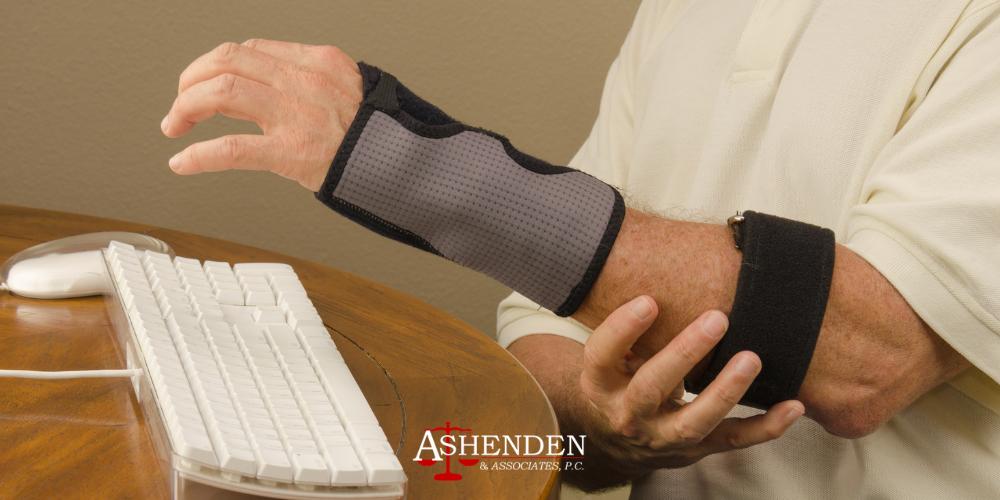
Carpal tunnel syndrome is wrist and hand numbness, tingling, and pain that occurs when there’s pressure on the median nerve in the wrist’s narrow passageway. This painful condition can be caused by other health issues and anatomical abnormalities, but it’s also frequently caused by repetitive movements of the hands. Many medical experts consider carpal tunnel syndrome as an “occupational illness,” because people who have been typing on a keyboard or working in a factory assembly line for decades have eventually developed the condition. So, this fact begs the question: can you get workers comp for carpal tunnel syndrome? The answer is yes, it’s possible, but it can be complicated. Below, our Sandy Springs work injury lawyers explain the complexities of carpal tunnel workers comp claims.
If your work-related injuries have caused you significant pain and financial hardship, you have grounds to file a worker’s compensation claim in the state of Georgia. Workers compensation can provide financial relief from medical bills and lost wages while you’re disabled or recovering. Sometimes, injured workers get denied workers comp benefits, or they don’t receive enough benefits. That’s why it’s so important to hire an experienced workers compensation lawyer at Ashenden & Associates. We have recovered millions of dollars in workers compensation benefits for our injured clients, and we can do the same for you. Call 770-394-8909 to schedule a free consultation at our law firm today.
What is Carpal Tunnel Syndrome?
Let’s start with some basic hand anatomy. The carpal tunnel is quite literally a small tunnel that travels from the wrist to the hand. It’s surrounded by small hand bones and ligaments. The median nerve runs through the carpal tunnel and allows the forearm, wrist, and hand to move. It also allows these body parts to feel textures, temperature, and pain.
Now – carpal tunnel syndrome occurs when the median nerve becomes pinched inside the carpal tunnel. This pinched nerve can cause numbness, tingling, and pain in the wrist and hand. Sufferers may also struggle to complete basic tasks with one or both hands. Without proper medical treatment, sufferers can experience permanent disability of the hands.
How Common is Carpal Tunnel Syndrome?
Carpal tunnel syndrome affects approximately 1 to 3 out of 1,000 Americans every year according to a 2022 study. Most sufferers are white, female, and between 40 to 60 years old.
How Does Carpal Tunnel Syndrome Happen?
Carpal tunnel develops when the median nerve gets pinched. This could happen due to a wrist fracture, rheumatoid arthritis, or other conditions that damage the nerves such as diabetes.
More commonly, though, carpal tunnel syndrome occurs from repetitive motion of the wrists and hands. Years of doing normal job duties like typing on a keyboard, clicking on a mouse, using a cash register, using vibrating tools, or any other repetitive tasks with the hands can cause someone to eventually develop carpal tunnel syndrome. Carpal tunnel cases are very common among data entry clerks, grocery store workers, frozen food factory workers working in an assembly line, construction workers who frequently use high-powered vibrating equipment, or really anyone who has a desk job.
Risk Factors for Carpal Tunnel Syndrome
Some people are more predisposed to getting carpal tunnel syndrome than others. Below, we list risk factors for this medical condition.
- Anatomy: Suffering from a broken wrist or arthritis can increase someone’s chances of developing carpal tunnel syndrome.
- Medical Conditions such as diabetes, thyroid issues, menopause, obesity, kidney failure, and lymphedema can raise the risk of someone developing carpal tunnel syndrome.
- Sex: Women are far more likely to develop carpal tunnel syndrome, possibly because the carpal tunnel is smaller in a female wrist compared to a male wrist. So there is less room for the median nerve to exist and function normally. Women may also be more prone to repetitive stress injuries in their hands because women work more desk jobs compared to men.
- Working Conditions: Working a particular job that requires lots of small, repetitive hand motions for several years can eventually lead to carpal tunnel syndrome. People who work in desk jobs and assembly lines, for example, have really high risks of repetitive motion injuries.

Symptoms of Carpal Tunnel Syndrome
Carpal tunnel symptoms include numbness, tingling, pain, and weakness in the affected arm, hand, and fingers. The injured person may struggle to hold a pen, type on their computer, or even grip a steering wheel. These common symptoms can get worse over the course of a few weeks or months. Additionally, carpal tunnel syndrome symptoms can definitely lead to permanent or temporary disability, depending on whether the person receives appropriate medical treatment.
Treatments for Carpal Tunnel Syndrome
Possible treatments for a carpal tunnel injury include wearing a hand splint, taking anti-inflammatory medication, doing physical therapy exercises for the hand(s), changing jobs, or undergoing carpal tunnel surgery. Doctors will determine the best course of treatment based on your age, sex, job, your medical history, and of course, how severe your pain is.
Can You Get Workers Comp For Carpal Tunnel Syndrome?
So – can you get workers comp for carpal tunnel syndrome? The short answer is yes, but it can be complicated.
Georgia law requires that all businesses with more than 3 employees must provide workers compensation benefits through their insurance company. Workers comp benefits are reserved for employees whose injury arose on the job. For example, maybe they suffered a major accident on the job, or they suffered a repetitive stress injury from their normal work duties.
Because a carpal tunnel injury can be considered work-related, sufferers can file a workers compensation claim and possibly recover medical expenses and lost wages. There are some problems surrounding workers compensation claims for carpal tunnel syndrome, and our Sandy Springs work injury lawyers explain that below.
Is Carpal Tunnel Syndrome a Work-Related Injury?
Yes, carpal tunnel syndrome can definitely be a workplace injury, but it can also be the direct result of another medical condition such as arthritis or diabetes. This is the first biggest problem with filing a workers comp claim for carpal tunnel syndrome.
In order to have a successful workers comp case for carpal tunnel syndrome, the injured worker would have to prove that they have no underlying medical conditions that caused the pinched nerve. Additionally, they would have to prove that the pinched nerve occurred solely from repetitive movements at work, and not from another activity outside of work. For example, a full-time writer could also be a professional pianist on the side. How would they know for sure that the carpal tunnel syndrome came from typing and not from years of playing the piano?
Work Accident vs. Occupational Disease
Another problem that could arise in a carpal tunnel workers comp claim is whether or not the condition is an “occupational disease” or a “work accident.” Some states classify this condition as the former, while others classify it as the latter. The distinction is very important because occupational diseases and work accidents require different evidence for obtaining compensation.
Work accidents generally cause sudden injuries. For example, a slip and fall accident on the job could cause a sudden traumatic brain injury or a spinal cord injury. So if your state only provides workers compensation benefits for work accidents, you would have to prove that your carpal tunnel syndrome came on suddenly. For example, maybe you broke your wrist on the job which later led to carpal tunnel syndrome.
Meanwhile, an occupational illness is generally a gradual thing. In order for carpal tunnel syndrome to be a compensable medical injury in a workers compensation claim, you would have to prove that because your occupation requires repetitive motion of the wrists and hands, you have a higher risk of developing the condition compared to the general public.
Proving That Carpal Tunnel Syndrome is an Occupational Disease In Georgia
Georgia is one of many states that considers carpal tunnel syndrome as an occupational disease. So you would have to prove carpal tunnel syndrome came directly from your normal work duties, and not some other hobby, activity, or medical condition. You can do this through medical evidence from your doctor. But hiring a Sandy Springs work injury lawyer is also a crucial part of proving your carpal tunnel workers comp claim. We can help you gather sufficient evidence to support your claim for carpal tunnel syndrome. That way, you get the workers compensation settlement you deserve.

Call Sandy Springs Work Injury Lawyers at Ashenden & Associates Today
The workers compensation system in Georgia can be complex and confusing at best. While it is possible to file a workers comp claim alone, with no legal help, it’s best to have a legal professional on your side to ensure you get the temporary or permanent disability benefits that you deserve. For decades, Sandy Springs workers compensation lawyers at Ashenden & Associates have been helping victims of work-related injuries receive the benefits they need. Whether you have carpal tunnel syndrome or a disc herniation from your job, we can help. Call 770-394-8909 to schedule a free consultation with our legal team today.

